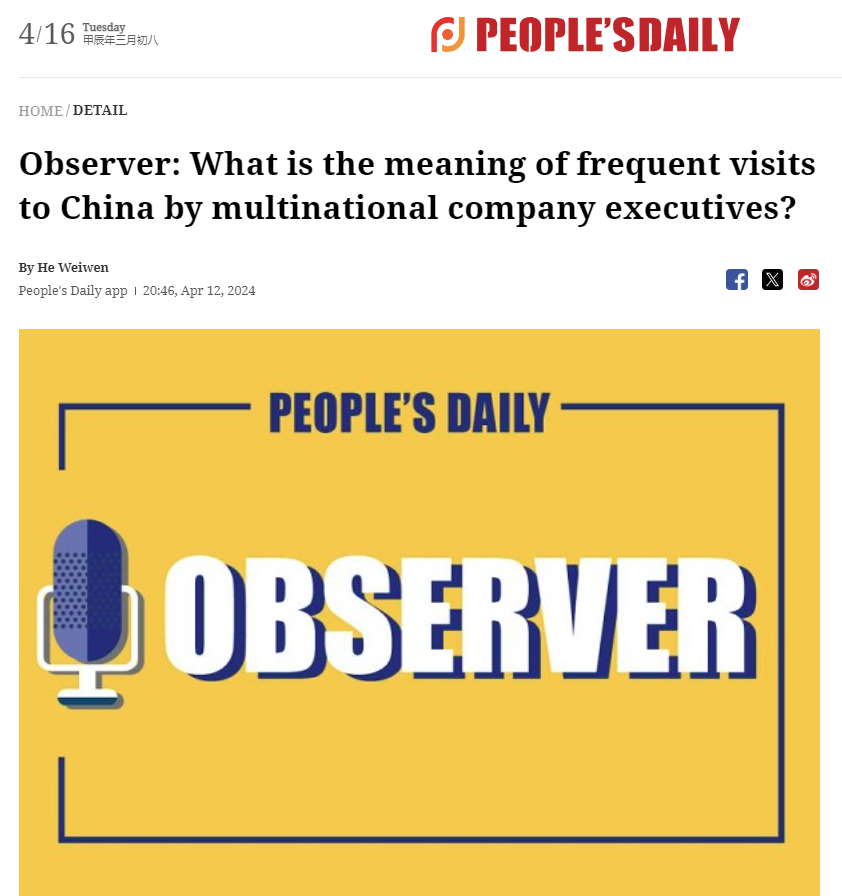LATEST INSIGHTS
Your Present Location: LATEST INSIGHTSHe Weiwen: Observer: What is the meaning of frequent visits to China by multinational company executives?
Source: People's Daily Published: 2024-04-12

Nearly 100 multinational CEOs participated in the China Development Forum 2024 last month and generally voiced optimism about China's long-term development.
This was in sharp contrast to Washington's frequent reports of increasing bans on Chinese chips, restricting imports of Chinese electric vehicles and even planning to replace Chinese cranes used in US ports on the ridiculous grounds of 'national security.'
However many multinational companies and investors are recognizing China's contribution to the global supply chain and are actively seeking deeper cooperation with China.
What does this mean?
First, world economic development needs China.
According to the World Economic Outlook report published by the International Monetary Fund (IMF) in October 2023, the global economy is projected to have an average growth rate of 3.1 percent over the five-year span from 2024 to 2028, which is the lowest rate in decades. The world economy has entered a period of sluggish growth and the development of China's digital economy, artificial intelligence and alternative energy are the main growth points worthy of attention. China's GDP growth reached 5.2 percent in 2023, and is expected to continue to reach around 5 percent in 2024. Its economic size is almost equivalent to that of the entire European Union, its digital economy second only to the United States and its manufacturing added value accounts for about 30 percent of the world's. Multinational companies need sufficient economies of scale for investment and production, and China is undoubtedly an excellent choice.
Second, China's position in the global supply chain is unassailable.
For three years, the US government has sought to form a values-based high-tech production and supply chain, focusing this effort predominantly on North America and across the Atlantic. US trade with East Asia, particularly China, has reduced dramatically.
According to Chinese customs statistics, US-China trade fell 11.6 percent year-on-year in 2023, with China's exports to the US dropping by 13.1 percent. US statistics indicate that trade with China diminished by 16.7 percent in 2023 compared to the previous year, while trade activity between the US and the European Union experienced notable expansion. Since 2024, China-US trade has taken a U-turn. Chinese customs statistics reveal that China's imports and exports to the US rose 3.7 percent year-on-year in the first two months of the year. US statistics indicate that imports from China decreased by 1.7 percent year-on-year over the same period. Imports from Germany decreased 4.3 percent, while those from the Netherlands declined 17.8 percent.
Thirdly, the Chinese government stays true to independent innovation and the process of high-standard opening-up.
In response to Washington's embargo and its decoupling initiatives in the name of 'national security,' China has promoted independent innovation. Chinese innovation is not confrontational but inclusive. China is willing to open its doors to the world to cooperate and innovate for common development. China has announced the complete cancellation of foreign investment restrictions in the manufacturing sector and the expansion of foreign-funded financial institutions' participation in its domestic bond market. These endeavors have undoubtedly given the scientific and business sectors of other countries great opportunities for development.
Going forward, we should wise up to the inherent law of the global supply chain, China's unique position and role in it, as well as the general trend of common development with enterprises from other countries.
(The author is executive director of the China Society of International Trade. The views expressed in this article are those of the author and do not necessarily reflect the positions of the People's Daily. Translated by Tang Yiyao, Liao Jiaxin and Lin Rui)























































































 京公网安备 11010802037854号
京公网安备 11010802037854号





